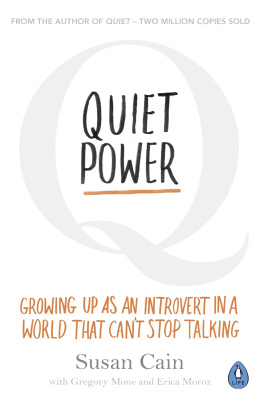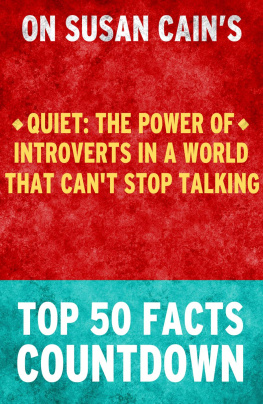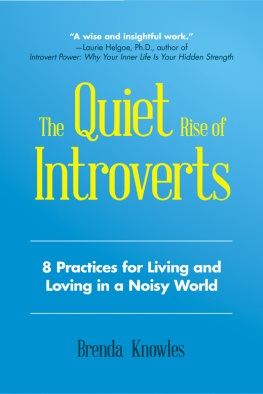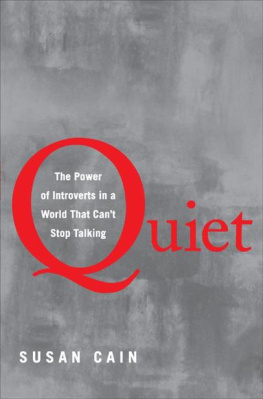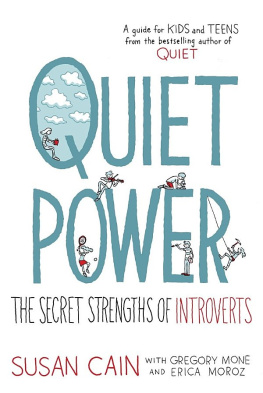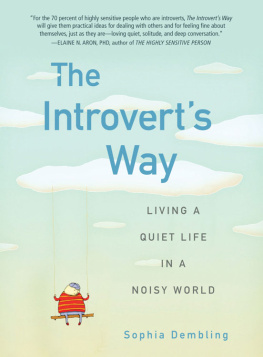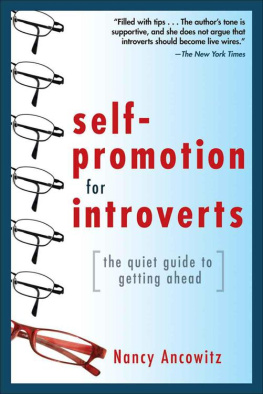Susan Cain
Quiet: the power of introverts in a world that cant stop talking
A species in which everyone was General Patton would not succeed, any more than would a race in which everyone was Vincent van Gogh. I prefer to think that the planet needs athletes, philosophers, sex symbols, painters, scientists; it needs the warmhearted, the hardhearted, the coldhearted, and the weakhearted. It needs those who can devote their lives to studying how many droplets of water are secreted by the salivary glands of dogs under which circumstances, and it needs those who can capture the passing impression of cherry blossoms in a fourteen-syllable poem or devote twenty-five pages to the dissection of a small boys feelings as he lies in bed in the dark waiting for his mother to kiss him goodnight. Indeed the presence of outstanding strengths presupposes that energy needed in other areas has been channeled away from them.
ALLEN SHAWN
I have been working on this book officially since 2005, and unofficially for my entire adult life. I have spoken and written to hundreds, perhaps thousands, of people about the topics covered inside, and have read as many books, scholarly papers, magazine articles, chat-room discussions, and blog posts. Some of these I mention in the book; others informed almost every sentence I wrote. Quiet stands on many shoulders, especially the scholars and researchers whose work taught me so much. In a perfect world, I would have named every one of my sources, mentors, and interviewees. But for the sake of readability, some names appear only in the Notes or Acknowledgments.
For similar reasons, I did not use ellipses or brackets in certain quotations but made sure that the extra or missing words did not change the speakers or writers meaning. If you would like to quote these written sources from the original, the citations directing you to the full quotations appear in the Notes.
Ive changed the names and identifying details of some of the people whose stories I tell, and in the stories of my own work as a lawyer and consultant. To protect the privacy of the participants in Charles di Cagnos public speaking workshop, who did not plan to be included in a book when they signed up for the class, the story of my first evening in class is a composite based on several sessions; so is the story of Greg and Emily, which is based on many interviews with similar couples. Subject to the limitations of memory, all other stories are recounted as they happened or were told to me. I did not fact-check the stories people told me about themselves, but only included those I believed to be true.
The North and South of TemperamentMontgomery, Alabama. December 1, 1955. Early evening. A public bus pulls to a stop and a sensibly dressed woman in her forties gets on. She carries herself erectly, despite having spent the day bent over an ironing board in a dingy basement tailor shop at the Montgomery Fair department store. Her feet are swollen, her shoulders ache. She sits in the first row of the Colored section and watches quietly as the bus fills with riders. Until the driver orders her to give her seat to a white passenger.
The woman utters a single word that ignites one of the most important civil rights protests of the twentieth century, one word that helps America find its better self.
The word is No.
The driver threatens to have her arrested.
You may do that, says Rosa Parks.
A police officer arrives. He asks Parks why she wont move.
Why do you all push us around? she answers simply.
I dont know, he says. But the law is the law, and youre under arrest.
On the afternoon of her trial and conviction for disorderly conduct, the Montgomery Improvement Association holds a rally for Parks at the Holt Street Baptist Church, in the poorest section of town. Five thousand gather to support Parkss lonely act of courage. They squeeze inside the church until its pews can hold no more. The rest wait patiently outside, listening through loudspeakers. The Reverend Martin Luther King Jr. addresses the crowd. There comes a time that people get tired of being trampled over by the iron feet of oppression, he tells them. There comes a time when people get tired of being pushed out of the glittering sunlight of lifes July and left standing amidst the piercing chill of an Alpine November.
He praises Parkss bravery and hugs her. She stands silently, her mere presence enough to galvanize the crowd. The association launches a city-wide bus boycott that lasts 381 days. The people trudge miles to work. They carpool with strangers. They change the course of American history.
I had always imagined Rosa Parks as a stately woman with a bold temperament, someone who could easily stand up to a busload of glowering passengers. But when she died in 2005 at the age of ninety-two, the flood of obituaries recalled her as soft-spoken, sweet, and small in stature. They said she was timid and shy but had the courage of a lion. They were full of phrases like radical humility and quiet fortitude. What does it mean to be quiet and have fortitude? these descriptions asked implicitly. How could you be shy and courageous?
Parks herself seemed aware of this paradox, calling her autobiography Quiet Strengtha title that challenges us to question our assumptions. Why shouldnt quiet be strong? And what else can quiet do that we dont give it credit for?
* * *
Our lives are shaped as profoundly by personality as by gender or race. And the single most important aspect of personalitythe north and south of temperament, as one scientist puts itis where we fall on the introvert-extrovert spectrum. Our place on this continuum influences our choice of friends and mates, and how we make conversation, resolve differences, and show love. It affects the careers we choose and whether or not we succeed at them. It governs how likely we are to exercise, commit adultery, function well without sleep, learn from our mistakes, place big bets in the stock market, delay gratification, be a good leader, and ask what if.* Its reflected in our brain pathways, neurotransmitters, and remote corners of our nervous systems. Today introversion and extroversion are two of the most exhaustively researched subjects in personality psychology, arousing the curiosity of hundreds of scientists.
These researchers have made exciting discoveries aided by the latest technology, but theyre part of a long and storied tradition. Poets and philosophers have been thinking about introverts and extroverts since the dawn of recorded time. Both personality types appear in the Bible and in the writings of Greek and Roman physicians, and some evolutionary psychologists say that the history of these types reaches back even farther than that: the animal kingdom also boasts introverts and extroverts, as well see, from fruit flies to pumpkinseed fish to rhesus monkeys. As with other complementary pairingsmasculinity and femininity, East and West, liberal and conservativehumanity would be unrecognizable, and vastly diminished, without both personality styles.
Take the partnership of Rosa Parks and Martin Luther King Jr.: a formidable orator refusing to give up his seat on a segregated bus wouldnt have had the same effect as a modest woman whod clearly prefer to keep silent but for the exigencies of the situation. And Parks didnt have the stuff to thrill a crowd if shed tried to stand up and announce that she had a dream. But with Kings help, she didnt have to.
Yet today we make room for a remarkably narrow range of personality styles. Were told that to be great is to be bold, to be happy is to be sociable. We see ourselves as a nation of extrovertswhich means that weve lost sight of who we really are. Depending on which study you consult, one third to one half of Americans are introvertsin other words,

![Syuzan Kejn Quiet [The Power of Introverts in a World That Can't Stop Talking]](/uploads/posts/book/831856/thumbs/syuzan-kejn-quiet-the-power-of-introverts-in-a.jpg)
